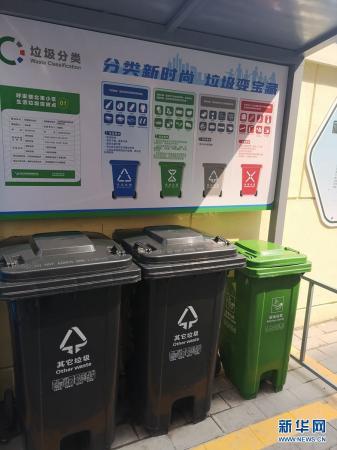Xinhua News Agency, Beijing, May 2nd (Reporters Guan Guifeng and Gai Boming) The newly revised Beijing Municipal Waste Management Regulations will come into effect on the 1st. Beijing's garbage classification has ushered in a new stage.
At the garbage disposal point of Beili Community, Hujialou, Hujialou Street, Chaoyang District, Beijing, two gray bins are other trash bins and one green bin is kitchen waste bins. Xinhua News Agency reporter Guan Guifeng photo
According to the regulations, domestic waste is divided into four categories: kitchen waste, recyclables, hazardous waste, and other waste. Beijing has also issued a "Guidelines for the Classification of Household Domestic Waste (Two Barrels and One Bag)", which recommends that residents set up "two barrels and one bag" at home to collect garbage by classification. "Two barrels" are kitchen waste bins and other trash bins; "one bag" refers to recyclables like paper, plastic bottles, cans, etc., which can be packed separately in a bag.
On the 1st, Beijing also re-painted the "replacement" garbage collection truck also appeared simultaneously. The green, gray, blue, and yellow transfer vehicles can transport kitchen waste, other waste, recyclables, and bulky waste. The waste body is printed with the name of the removal unit and the supervision telephone. The relevant person in charge of the Facilities Division of the Beijing Municipal Management Committee said that more than 8,000 garbage collection trucks in the city will be repainted to facilitate identification and supervision by the citizens.
Li Rugang, deputy director of the Beijing Municipal Management Committee, said that the treatment capacity of Beijing's garbage disposal facilities has steadily improved. At present, the city has set up more than 113,000 garbage classification barrel stations and classification post stations, with a total of 1259 kitchen waste transportation vehicles, 6412 other garbage transportation vehicles, 980 closed cleaning stations and small garbage transfer stations.
Starting from May 1, the Beijing Urban Management Law Enforcement Department will carry out a special three-month domestic garbage strengthening law enforcement special action, focusing on investigating and handling domestic garbage mixed piles, mixed transportation and other behaviors of receiving and transporting enterprises. Wen Tianwu, deputy director of the Beijing Urban Management Law Enforcement Bureau, said that for residents who do not implement the illegal behavior of household garbage classification, the focus is on guidance, using a combination of educational dissuasion, written warnings and law enforcement penalties.
Liu Jianguo, a professor at the School of Environmental Sciences at Tsinghua University, analyzed that Beijing's waste sorting should be more focused on the service side, and that management should be based on service. In the early stage, education and guidance should be given to residents.
What are the people of Beijing who are faced with the "big test" of garbage classification paying attention to? Baidu search big data shows that in the past 7 days, the issues related to the search for garbage classification in Beijing have increased by 108% month-on-month. Among these issues, "what kind of waste is leftover food"; . In addition, in the past month, the search interest of "junk processors" has increased by 35% month-on-month, which is one of the products with the largest increase in search interest in April.
The “Beijing Garbage Classification Collection” WeChat applet has entered more than 3,000 types of garbage that are common in daily life. "It also improves the fault tolerance function, for example, whether it is inputting big bats or big bones, the final search results are consistent." Liu Wei, a staff member of the Publicity Department of the Beijing City Management Committee, said.
In addition, the Beijing City Management Committee has also jointly developed a smart applet for garbage classification with Baidu App to provide citizens with garbage classification information and garbage identification services.

